 Vaccines during pregnancy. It used to be that we cautioned pregnant women against taking any medications during pregnancy, including vaccines. When I was pregnant for the first time in the late 1990s, the doctors offered me exactly zero vaccines. But these days your obstetrician may offer you as many as four vaccines during pregnancy.
Vaccines during pregnancy. It used to be that we cautioned pregnant women against taking any medications during pregnancy, including vaccines. When I was pregnant for the first time in the late 1990s, the doctors offered me exactly zero vaccines. But these days your obstetrician may offer you as many as four vaccines during pregnancy.
What do American doctors recommend about vaccines during pregnancy?
The CDC currently recommends that pregnant women in America get:
- Flu vaccine: If your pregnancy spans two flu seasons, you will likely be offered a vaccine against the flu twice.
- TdaP: This is a vaccine against tetanus, diphtheria, and acellular pertussis. The rationale behind giving this vaccine is to offer the unborn baby protection against pertussis (whooping cough), which can be dangerous for infants, especially those under two months old.
- Coronavirus vaccine: The CDC points out that pregnant women are at higher risk of getting sick if they contract coronavirus than people who aren’t pregnant. They further state that pregnant women should “consider getting a COVID-19 vaccine when it’s available to you.” So the CDC has not yet fully recommended that all pregnant women receive this vaccine, which was approved under an Emergency Use Authorization and is not yet available widely. But the American College of Obstetricians and Gynecologists now states: “ACOG recommends that COVID-19 vaccines should not be withheld from pregnant individuals.” Oregon’s health authority agrees. OHA is actively promoting the COVID-19 vaccine during pregnancy.
They also recommend hepatitis B if you test positive for hepatitis; hepatitis A if you have a history of chronic liver disease; and meningococcal or other travel-related vaccines, if indicated.
What this means is that American women and their unborn babies are now getting up to six vaccines against as many as a dozen different diseases or disease strains during pregnancy.
Feeling small at the doctor’s office
Have you ever noticed how small you sometimes feel when you’re sitting in a doctor’s office waiting to see your obstetrician? Maybe it’s because the physician’s assistant (aka a complete stranger) has just weighed you. Or because you just had to pee in a small plastic cup … and you missed. Or because you tried so hard to get pregnant and you so badly want the baby to be healthy.
Some people feel reassured at the doctor’s office. But most of the rest of us feel intimidated. Interestingly, even pregnant doctors report feeling intimidated by their obstetricians sometimes. As do educated mamas-to-be who themselves have advanced degrees.
So there you are, pregnant and feeling small, sitting on the examination table. Depending on the practice, you may be buck naked except for that horrible paper gown that crinkles every time you shift your weight. Then the FULLY DRESSED doctor comes in, clearly in a hurry, enthusiastically washing their hands (we hope), and smiling at you compassionately.
(At least you think they’re smiling. It’s a bit hard to tell if they happen to be wearing a mask.)
As the doctor sits down in the rolling chair beside you, or plops down in front of an oversized computer screen, they will invariably tell you it’s time for your vaccines during pregnancy, which the medical assistant will be bringing right in. That doctorly sound of authority and interest relayed by a clipped and no-nonsense tone of voice.
Why get any vaccines during pregnancy? A closer look
According to the CDC, vaccines help keep a pregnant woman and her growing family safe from infectious diseases.
Whooping cough:
According to the CDC, whooping cough is one of the most common vaccine-preventable diseases in the United States. It is caused by bacteria that spread easily from person to person through personal contact, coughing, and sneezing. It can be very serious for babies and can cause them to stop breathing. Pregnant women should receive a dose of Tdap during each pregnancy, preferably at 27 through 36 weeks: to protect themselves and their baby. In addition, they recommend that family members and caregivers (like babysitters and grandparents) of infants get vaccinated against pertussis.
Flu vaccine:
The CDC argues that the inactivated flu vaccine is safe, and very important, for a woman who is pregnant. This is because pregnant women who get the flu are at increased risk for severe illnesses from influenza and their babies are also at risk. Complications from the flu can include premature labor, babies that are small for gestational age, hospitalization, and, rarely, death … pregnant woman with flu also have a greater chance for serious problems for their unborn baby, including premature labor and delivery. According to the CDC, pregnant women can receive the flu shot at any time, during any trimester.
Coronavirus vaccine:
The CDC argues that pregnant people are at increased risk for severe COVID-19 illness and that they might be at risk of adverse pregnancy events, like preterm birth.
So why refuse vaccines during pregnancy?
-
You’re worried that vaccines during pregnancy are used off-label
Vaccine manufacturers themselves do NOT assert that these vaccines are safe. Why? Because the vaccines have not been safety tested in pregnant women. When you’re pregnant you have two people to consider: yourself and your unborn baby. It is a reasonable and evidence-based choice to say no thank you to vaccines during pregnancy because they may harm you or they may harm your baby, either soon after being administered or sometime in the future.
-
You know vaccines contain both harmful and untested ingredients
Multidose vials of the flu vaccines given to pregnant women still contain thimerosal, a mercury-derived preservative that causes brain damage, according to CDC researchers. Pregnant women are cautioned to avoid mercury as much as possible. The same doctors who tell them to avoid mercury, then say that the mercury in flu vaccines is safe. Aluminum is another vaccine ingredient that is a cause for concern. As a pregnant woman, it is a reasonable and evidence-based choice to say no thank you to vaccines during pregnancy because you would rather not take the risk that vaccine ingredients, including thimerosal and aluminum, may harm you or your baby.
-
The severe adverse effects from vaccines concern you
The flu vaccine is one of the most problematic vaccines for adults, resulting in thousands of reports to VAERS, the Vaccine Averse Event Reporting System, per year and dozens of no-fault settlements, where the United States government pays money to people who have been injured by the vaccines (every vaccine administered is taxed by the government. This money goes into a pool to then use for vaccine injuries. So consumers shoulder the burden both of paying for the vaccines and of paying for vaccine-induced injuries).
The flu vaccine has been documented to result in: Guillain-Barré Syndrome, myelopathy and radiculopathy; psoriasis and psoriatic arthritis; chronic inflammatory demyelinating polyneuropathy; skin rash, fatigue, and scarring; brachial neuritis; shoulder injury related to vaccine administration, autoimmune demyelinating condition, bursitis, Bell’s palsy and urticaria/angioedema; bilateral brachial neuritis; meningoencephalitis and optic neuritis; transverse myelitis, serum sickness and pain amplification syndrome of childhood/fibromyalgia; acute disseminated encephalomyelitis; rheumatoid arthritis; significant aggravation of an underlying COPD and other pulmonary conditions, and death. As a pregnant woman, you would rather not take the risk.
It’s very hard to make any kind of accurate risk assessment of the various brands of coronavirus vaccines during pregnancy, since these vaccines remain untested and adverse outcomes can take years to uncover.
However, there have been nearly 2,000 deaths, hundreds of miscarriages, and over 31,000 adverse events and side effects (from fever to stroke) reported so far.Some information coming in from peer-reviewed science journals is also concerning.“COVID-19 vaccines designed to elicit neutralising antibodies may sensitise vaccine recipients to more severe disease than if they were not vaccinated,” explain this biochemist and this pathologist. “… (and they) may worsen COVID-19 disease via antibody-dependent enhancement.”
-
You realize there is NO science on the safety of giving 3 vaccines during pregnancy
Researchers have not conducted safety studies on giving pregnant women a Tdap, coronavirus vaccine, and flu vaccine during pregnancy. Yet we are asserting to pregnant women that these vaccines in combination are safe. Doctors and the CDC also reassured us that diethylstilbestrol during pregnancy, and X-raying pregnant women’s pelvises was safe. DES caused an aggressive form of cancer, clear cell adenocarcinoma. It also caused debilitating reproductive abnormalities. We now know pregnant women should avoid X-ray exposure as much as possible. The effects of something toxic on a gestating fetus may not become apparent for several years. As a pregnant woman, you would rather not take the risk.
-
You’re concerned about vaccine injury
Over 5,000 families have been compensated for vaccine injuries. Hundreds of thousands more Americans have not received compensation. But these families, too, have witnessed their own health or their children’s health decline, either immediately or over time, following vaccines. Like this one and this one. Your family may be susceptible to vaccine damage. As a pregnant woman you would rather not take the risk associated with vaccines during pregnancy.
-
Vaccines are against your religion
You are one of the approximately 400,000 adherents to the Church of Christ, Scientist. Or you are one of the some 350,000 members of the Old Order Amish community in the United States. Or you are an Old Believer or a devout Christian, like this mom. To that end, you’ve looked closely at the Bible and at your family’s health choices. And you’ve decided to forego some, or all, vaccines.
Many practicing Catholics are also turning away from some vaccines. If you’re a practicing Catholic or a Christian who does not believe in abortion, you do not want to use products made from cell lines grown on aborted fetal tissue. The breaking news, reported by USA Today, is that the official word from on high may be that it’s morally okay. But if you feel strongly that abortion is wrong, you respectfully and politely disagree.
-
You don’t think the ingredients in the Tdap vaccine are safe
You’ve read the ingredient list for the Tdap (Adacel) vaccine and you would rather not have the following ingredients injected into your blood stream while you are pregnant: aluminum phosphate, formaldehyde, glutaraldehyde, 2-phenoxyethanol, ammonium sulfate, Stainer-Scholte medium, dimethyl-beta-cyclodextrin, modified Mueller’s growth medium, Mueller-Miller casamino acid medium (without beef heart infusion).You’ve read the ingredient list for the Tdap (Boostrix) vaccine and you would rather not have the following ingredients injected into your blood stream while you are pregnant: formaldehyde, glutaraldehyde, aluminum hydroxide, polysorbate 80 (Tween 80), Latham medium derived from bovine casein, Fenton medium containing a bovine extract, Stainer-Scholte liquid medium.
-
Doctors you trust recommend against vaccines during pregnancy
You are aware that more and more conventionally trained medical doctors with degrees from Ivy League and other outstanding universities are speaking out against vaccines, like this one, this one, this one, this one, this one, this one, this one, this one, this one, this one, this one, this one, this one, this one, and this one. You know there are even whole medical communities, like this one and this one, that have concluded that we are over-vaccinating pregnant women and children. You’re also aware that it’s the best educated families with incomes of over $75,000 a year that are most often choosing not to vaccinate. Since these are also parents who usually have the time, education, and money to make the most careful decisions about their children’s health and wellbeing, and who like to do the research for themselves, instead of vilifying them (a favorite pastime of the mainstream American media), you suspect they’re actually on to something.
How to say “No, but thank you,” to vaccines during pregnancy
Now let’s go back to the examination table where you’re sitting half-naked looking at your doctor.
The doctor: “Everything looks great. I’ll send the nurse in for your vaccines.”
You: “No, thank you.”
It’s that easy.
You can say, “No, thank you.”
Or, “We’ve decided not to do that vaccination at this time.”
You could also try, “We don’t do vaccines during pregnancy in our family.”
Or, “Thank you very much but I will not be having these vaccines during pregnancy at this time.”
Real-parent experiences saying no to vaccines during pregnancy
Advice is easy to give and hard to follow. So I decided to ask some parents on social media (which I’ve been fondly referring to as FaceAche these days) how they handled saying no thank you to vaccines during pregnancy and what their practitioners’ reactions were.
With a smile
“I simply say- no thank you with a smile. and they don’t bother me. Idk if it’s because my husband is an RN or if it’s because I’m always very firm and confident but I’ve never had a doctor challenge me or even ask me why.”
I said I’m worried about shots during pregnancy
“When I was pregnant they offered the flu. They said it was very dangerous for me to not get it. I wasn’t pro or anti vax, I just heard bad things about the flu shot and didn’t want it. I said I’ve just heard a lot of bad things and I don’t want to take the risk. The doctors scolded me and then left it at that. It was very simple. No Thanks, I’m worried about having the shot during my pregnancy and causing complications, and that was it.”
“We don’t vaccinate” is the perfect line
“I simply say, “We don’t vaccinate,” and a doctor only hassled me once. So I decided to switch doctors after because he was not at all what I was looking for in a pediatrician.”
Call ahead before choosing a doctor
“I found that being proactive and calling ahead of time has helped tremendously. Since I’ve been doing that no doctor has harassed us. When the question about vaccines comes up a simple no is all I have to say & not made to feel terrible for it.”
We found a new doc: be polite but don’t back down
“Our first doctor was rather rude when we told him we would not be doing vaccines. He berated my wife while she was in the hospital. I went into his office the next day and fired him in front of his patients in the waiting room!
“We then interviewed several doctors before choosing a new one. She’s been wonderful and never pressures us on anything. Our new doctor has also been very supportive of us having a choice with the vaccinations and is rather impressed with the knowledge we displayed.
“She’s gone on to research vaccines more and she admitted last time we were in there that she is even growing skeptical the more she reads. So my thought is always be polite if possible but don’t back down when they try to pressure you. Be firm. You can fire your doctor. They work for us… not the other way around.”
What if your doctor gets irate when you say you don’t want vaccines during pregnancy?
While it’s always your right to reject a pharmaceutical product, you doctor may get very angry if you decline vaccines during pregnancy. We’ve heard stories of doctors yelling at their pregnant patients. Some doctors have even followed families to the check-out counter, saying things like, “I guess you’re the kind of mother who doesn’t care if your baby lives or dies.” Cognitive dissonance hurts.
These emotional reactions are nothing short of bullying, which is the last thing a pregnant woman needs.
Remember that you are the consumer.
Remember that your doctor, however high and mighty he or she might act, is working for you.
You don’t need to tolerate rudeness, shaming, scare tactics, or bullying from a healthcare provider.
The good news is that there are now hundreds, if not thousands, of vaccine-friendly doctors. There are doctors in every state who are not pushing vaccines during pregnancy. These doctors respect a pregnant woman’s right to choose.
So if your obstetrician reacts with fury when you politely decline vaccines during pregnancy, find another doctor. Or a midwife. You deserve a gentle healthcare provider whose mission is to help you and your baby be healthy and happy, not to peddle vaccines.
Related articles:
Wondering About Vaccines, Not Sure Where to Start
Three Toxins to Avoid During Pregnancy, and Three Things to Embrace
Mice Given Antibiotics Die of the Flu
Below are screenshots of extreme reactions to the Coronavirus vaccines. Mainstream experts apologizing for the status quo will insist that these reactions are rare. Perhaps they’re correct. But when you are wondering about vaccines during pregnancy, isn’t it better to be safe than sorry?
Trigger warning: miscarriage, extreme pain, and death.
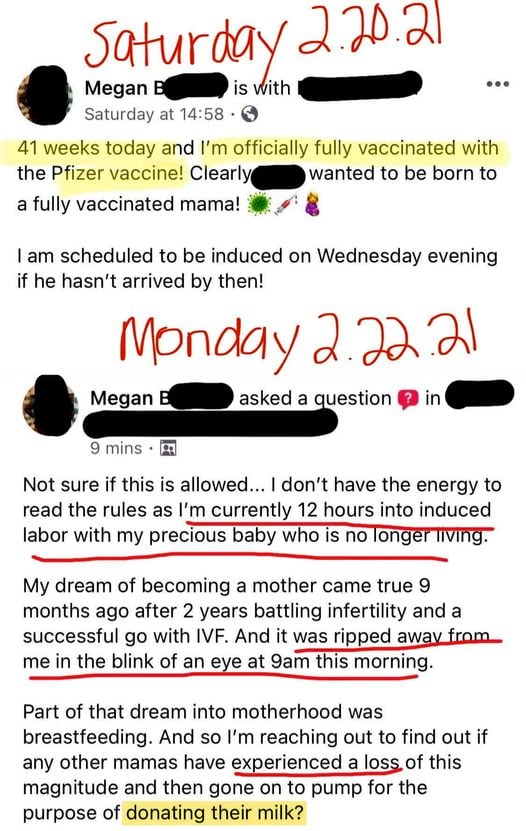

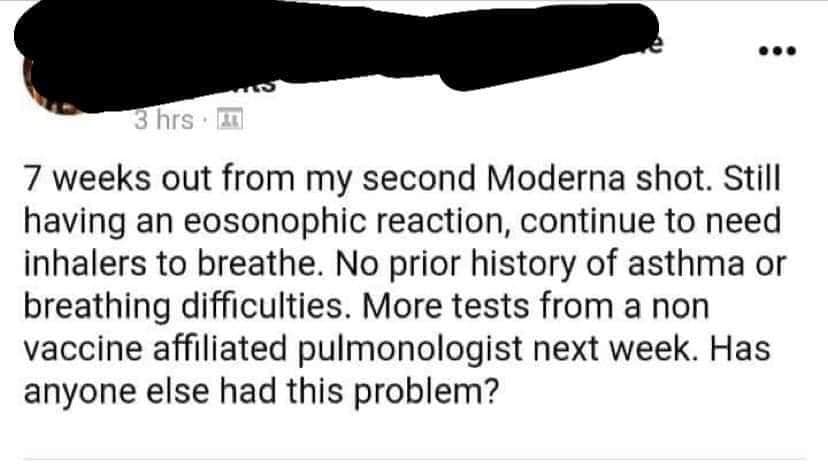
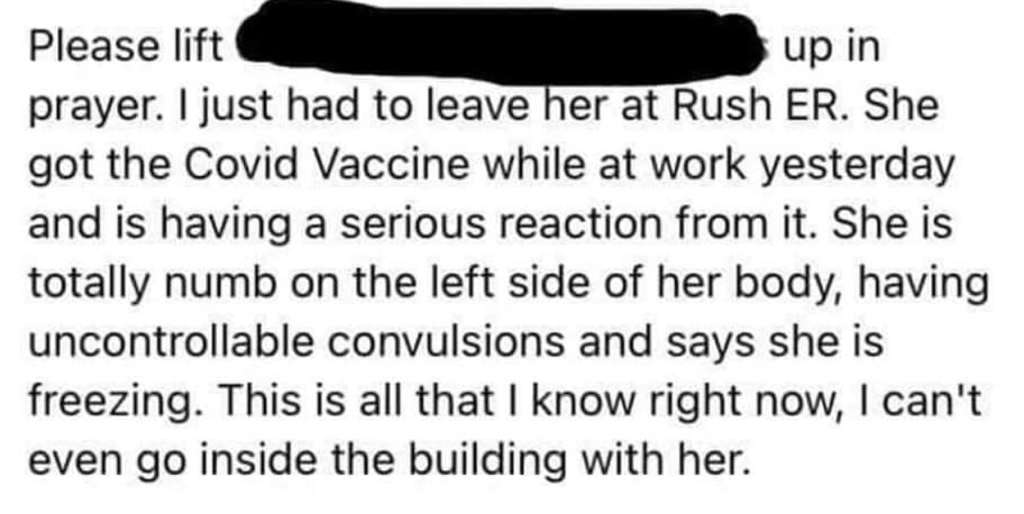
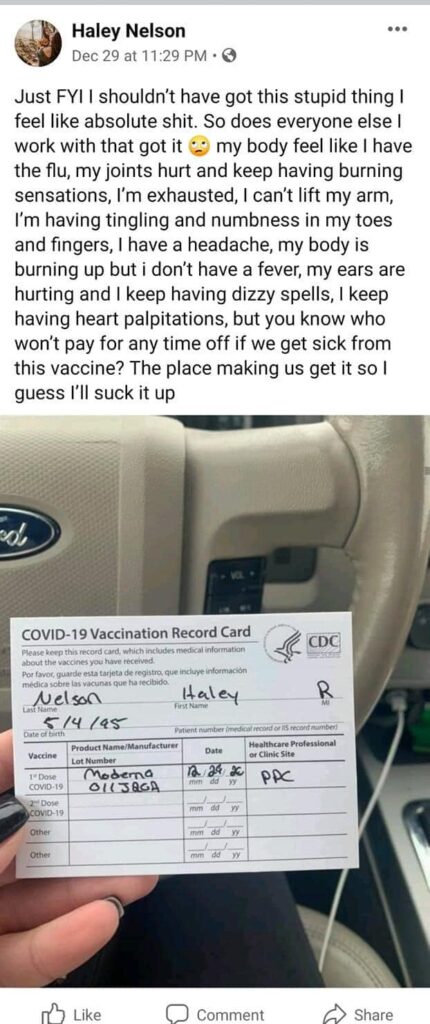

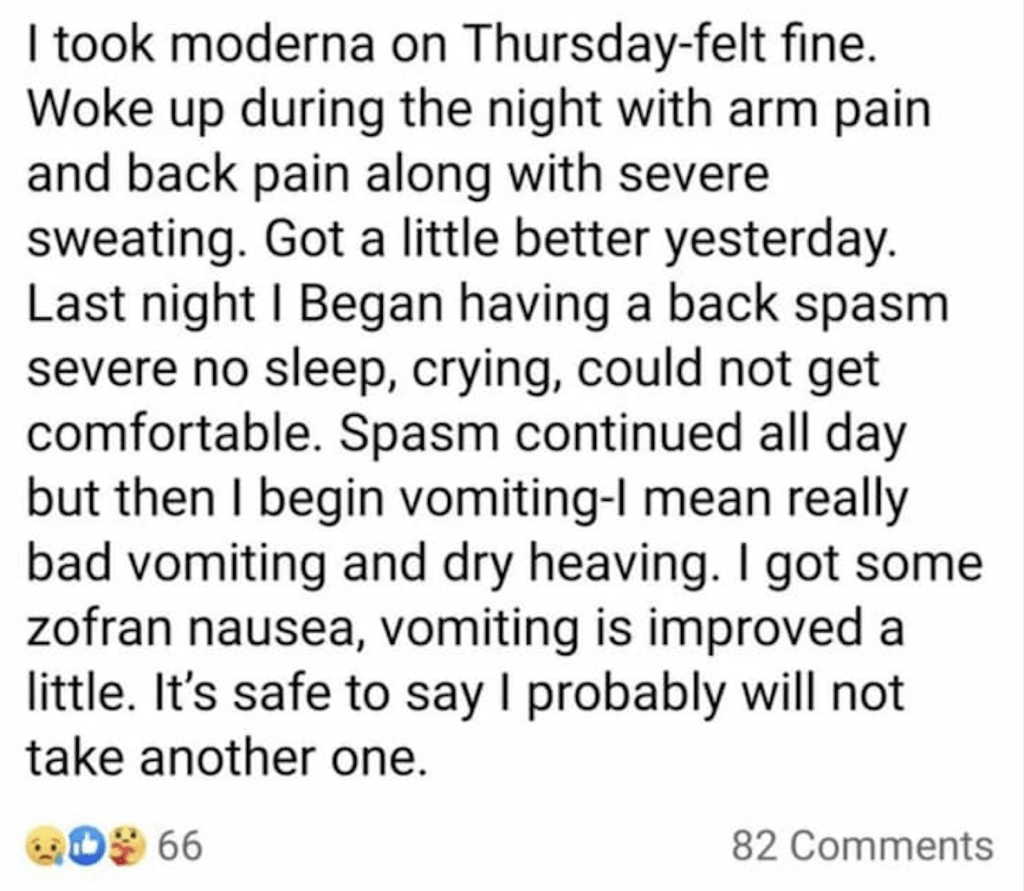

Published: March 18, 2021
Last updated: March 30, 2021
Leave a Reply